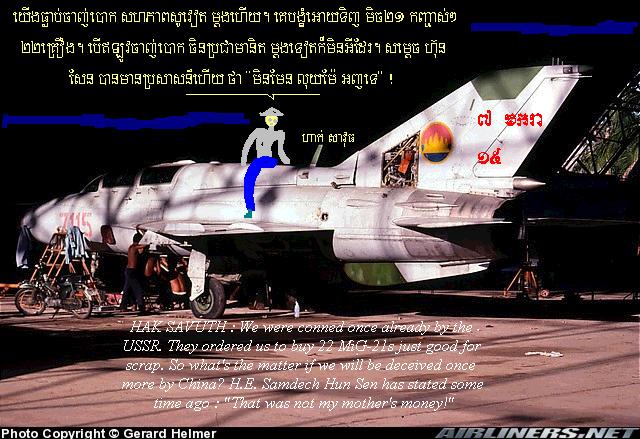
| RENCONTRER DIEU |
COURRI@L 2005 | MEET WITH GOD |
 |
|
Cambodia's ex-king stakes out final battle on borders (2005-May-18)
|
PHNOM PENH, (AFP) - Cambodia's new border council headed by
former king Norodom Sihanouk looks headed for nowhere,
analysts said, but gives the ailing king-father one last battle for his
country. At age 82 and six months after his abdication, Sihanouk has taken
on a final battle to settle an issue close to his heart: marking borders
and defending the territorial integrity of Cambodia, which claims it has
lost ground to its more powerful and populous neighbors Thailand and Vietnam.
Sihanouk accuses Vietnam of encroaching on Cambodian soil, and cites "unjust
treaties" signed under pressure in 1982, 1983, and 1985 which gave up land
to its neighbor during the occupation by Vietnamese forces who had ousted
the Khmer Rouge.
The border feuds tap into an often virulent anti-Vietnamese sentiment in Cambodia, fueled by resentment of Vietnam's expansion over the centuries. But the border issue is a real problem, experts said. The border left from colonial times is vague in areas and doesn't match the maps. |
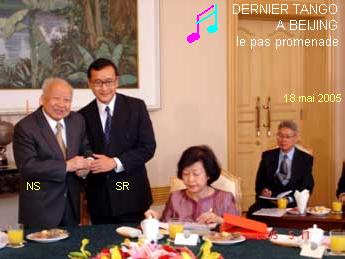 |
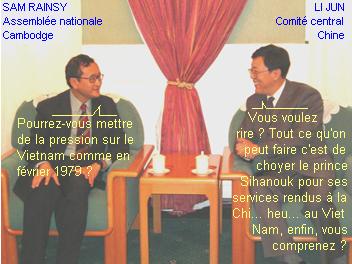
Caricature par N. P. |
Sihanouk complained on the day of the first meeting that the council was
effectively powerless, with a purely advisory role to government. By decree,
the council must also reach unanimous decisions. Its second meeting is
not expected for months. "It's a joke," said Lao Mong Hai of the Center
for Social Development. "Norodom Sihanouk had maybe hoped he would have
great powers, but the decrees deflated that balloon, and he was disappointed."
"He can't do anything. It's a waste of time and energy," he said. A
long-time Cambodia observer concurred: "This is a council with no purpose."
"They will never agree unanimously. And (Prime Minister) Hun Sen has
the Vietnamese behind him."
The royalist FUNCINPEC and the Sam Rainsy Party, both represented on the council, have tried to win more powers for Sihanouk, but Hun Sen's Cambodian People's Party hasn't gone along. "Vietnam created Hun Sen and his government," Lao Mong Hai said, explaining that it was hard to imagine the premier pushing Vietnam to re-examine borders set in treaties in the 1980s. |
| AP - An armed Thai ranger looks from a hill-top post while guarding the ancient Preah Vihear temple on the Thai side at the Thai-Cambodian border in Sisaket province, northeastern Thailand in this photo taken Sept. 9, 2004. Cambodia has closed its border near this northern temple after Thailand stationed hundreds of troops on its side of the disputed frontier, a provincial governor said Sunday, May 15, 2005. The border crossing was closed Saturday, May 14, 2005, Preah Vihear Gov. Preab Tan said. (AP Photo / Apichart Weerawong) |
 |
Que la littérature khmère cesse de glorifier les héros du roman classique Toum Teav ! (2005-Mai-15)
|
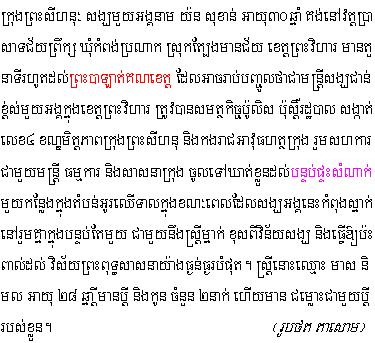 |
Hun Sèn maintient les traités
de 1983 et 1985 (2005-Mai-13)
Le Vietnam respecte scrupuleusement les accords
sur les frontières avec le Cambodge
|
Hanoi, 12 mai (AVI) - Le Vietnam considère la fondation
du Conseil supérieur des affaires frontalières comme
une affaire intérieure du Cambodge, a souligné Le Dung, porte-parole
du ministère des Affaires étrangères du Vietnam. Sur
la réaction du Vietnam à propos de l'adoption par le roi
du Cambodge, Norodom Sihamoni, de la fondation de ce Conseil qui a pour
but d'examiner les litiges frontaliers avec les pays voisins, dont le Vietnam,
le porte-parole du ministère des AE Le Dung a souligné: La
politique immuable du Vietnam est de respecter l'indépendance, la
souveraineté et l'intégrité territoriale des autres
pays, dont le Royaume du Cambodge.
Le Vietnam respecte scrupuleusement les accords sur les frontières et les territoires signés avec le Cambodge sur la base de l'égalité véritable et le respect mutuel, en conformité avec les droits et les pratiques internationales. Au forum en mars dernier du Comité mixte des frontières Vietnam-Cambodge, les deux parties sont tombées d'accord sur l'intensification des négociations concernant le problème frontalier en souhaitant régler dans un meilleur délai les litiges frontaliers en suspens, dans l'esprit d'égalité, de compréhension mutuelle et du bon voisinage, en vue d'édifier la frontière vietnamo-cambodgienne en une ligne frontalière de paix, d'amitié et de coopération pour le développement. |
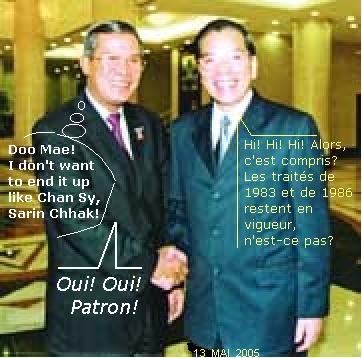 |
N.P. : Les traités de 1983 et de 1985, signés pendant l'occupation vietnamienne, après l'emprisonnement de Pen Sovann et la mort suspecte de Chan Sy, faisaient du Cambodge une colonie de fait du Vietnam. Les Accords de Paris, signés en octobre 1991, libèrent Pen Sovann et abolissent les traités sus-mentionnés. Mais Hun Sèn et le PPC continuent d'honorer ces traités et ont même tenté d'obtenir, sans succès, la signature du roi-retraité Norodom Sihanouk.
|
|
|
( PREVIOUS ) |
|
|
|
|
|
|
|
|
|
|